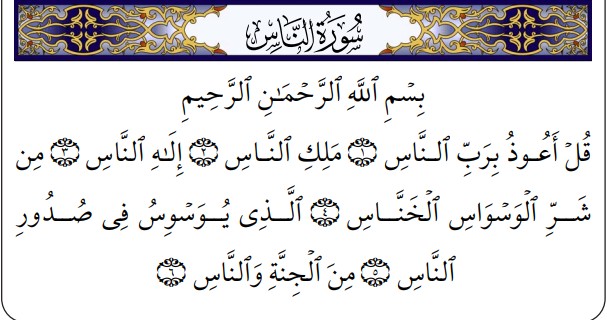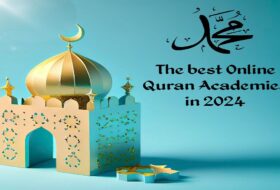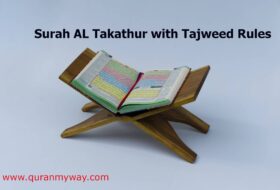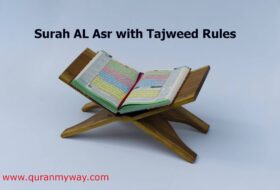1-An-Nas ( MANKIND ).
2-Arrange of Surah : (114).
3-Number of Ayats: (6).
4-where revealed: Makkiyah.

Say, “I seek refuge in the Lord of mankind. (قُلْ أَعُوذُ بِرَبِّ النَّاسِ (١
The King of mankind. (مَلِكِ النَّاسِ (٢
The God of mankind. (3) إِلَهِ النَّاسِ
From the evil of the sneaky whisperer. (4) مِنْ شَرِّ الْوَسْوَاسِ الْخَنَّاسِ
Who whispers into the hearts of people. (5) الَّذِي يُوَسْوِسُ فِي صُدُورِ النَّاسِ
From among jinn and among people. (مِنَ الْجِنَّةِ وَالنَّاسِ ﴿ 6
⇒ We Have Course For Explain Surah Nas See New offer ⇐
Deep Meaning (Tafseer).
1. Say: “I seek refuge with the Lord of humankind,
قُلْ أَعُوذُ
“Say: ‘I seek refuge ” Allaah’s command to the Messenger of Allaah (r) affirms to the reader or listener that Prophet Muhammad (r) was only a messenger conveying a divine message and not the author of the Quraan.
It is among the clear evidences which prove that the Qur’aan is the Word of God and not a product of Muhammad’s (r) literary skills. The Almighty clearly states that in the Qur’aan:
وَمَا عَلَّمْنَاهُ الشِّعْرَ وَمَا يَنبَغِي لَهُ ۚ
And I have not taught him poetry, nor is it suitable for him.” (Soorah Yaaseen, 36: 69)
بِرَبِّ النَّاسِ
With the Lord of humankind.” Mention of His Lordship (ruboobiyyah) over humankind includes the fact that He created them, designed them, and He manages their affairs. He is responsible for their upbringing and their education.
It is He who rectifies and improves their situations and it is He alone who protects them from harm and guards them from corrupting influences.
All of that can only take place if He has absolute power, shows supreme mercy and desires only goodness for His creatures. Furthermore, He must possess intimate knowledge of the finest details of their various situations, while being able to answer all their prayers and requests, and remove all their calamities and distress.
The Almighty mentioned that He is the Lord of humankind, though He is the Lord of all creation, for two reasons:
- Because humankind as a whole has been exalted and honored above most of creation. Thus, by mentioning them in particular, He informs humans that He remains their Lord and Master regardless of how great they may become.
- Because He instructed that refuge be sought from their evil. Thus, by mentioning them specifically, He clarifies that only He can provide refuge for them.
2. “The King of humankind.” مَلِكِ النَّاسِ
Allaah’s “Kingship” implies that He alone has absolute power and authority over humans and they are all His slaves and possessions. He is the King of kings, which is why the Prophet (r) prohibited anyone from taking this title.1 Allaah is the true King who alone can provide security for people in times of calamity and difficulties. He is the Only One who can come to their aid if they come under attack from their enemies.
3. “The God of humankind.” إِلَهِ النَّاسِ
Allaah further describes Himself as the true God of human beings and thereby negates the existence of any other legitimate objects of worship in creation. Just as He alone is Lord and King and no one shares in His Lordship or His
Kingdom, He alone is their God and the Only One deserving their worship.
Thus, it is inappropriate to associate partners in His Divinity just as He is without associates in His Lordship and Dominion.
This is a common method used throughout the Qur’aan. After affirming their Tawheed (Unitarianism/monotheism) in regards to Allaah’s Lordship and Dominion, Allaah calls on them to recognize the Unity of His Divinity which
they were denying.
If He is Unique in His Lordship, Dominion and Divinity, it is obviously incorrect to call on, fear, have hope in or love anyone or anything besides Him.
No one should be submitted to, called upon or trusted in besides Him. For, whoever one submits to, calls upon or trusts in is either the real sustainer and maintainer of human affairs who is none other than Allaah, or he is a slave of
Allaah.
4. “From the evil of the whisperer who withdraws. مِنْ شَرِّ الْوَسْوَاسِ الْخَنَّاسِ
Allaah follows the same presentational pattern of the previous chapter to which this chapter has been twinned. After describing with whom refuge should be sought, the Almighty identifies from which aspect of creation refuge should be sought, it is the last major area of evil in this world, the Devil.
مِنْ شَرِّ الْوَسْوَاسِ
From the evil of the whisperer.” What is meant by “the whisperer” here is one who inserts or introduces false thoughts, imaginations, views, and opinions into the heart. The form of the Arabic word for whisperer “waswaas” is an intensive form indicating continual whispering and not just an occasional whisper.
الْخَنَّاسِ
“Who withdraws,” and runs away when the name of Almighty Allaah is mentioned. That is Satan who, as the Prophet (r) said, runs away when the call for prayer is made. Both calls to prayer have the ability to drive away the devils.
5.“Who whispers in the souls of humankind. الَّذِي يُوَسْوِسُ فِي صُدُورِ النَّاسِ
The third characteristic of Satan is mentioned in this verse. The first characteristic is that he is an incessant whisperer, constantly suggesting evil.
The second is that he appears and disappears, deceiving his clients or targets into thinking that he has left them only to appear once again when they least expect him, when their guards are down. The third is depth to which his hisperings can reach.
And:
The Almighty gave Iblees and the evil jinn the ability to enter human beings and affect their hearts and minds.
Safiyyah bint Huyayy, wife of the Prophet (r), reported that she went to Allaah’s Messenger (r) while he was in seclusion (i‘tikaaf) in the last ten days of Ramadaan. She had a talk with him for a while, then she got up in order to
return home. The Prophet (r) accompanied her and when they reached the gate of the mosque, opposite the door of Umm Salamah, two men from the Ansaar greeted him as they passed by. He called them back saying, “Don’t run away.
She is my wife, Safiyyah bint Huyayy.” They replied, “Glory be to Allaah, O Messenger of Allaah, [we could never have thought otherwise]!” They felt embarrassed. But the Prophet said to both of them.
(إن الشيطان يجري من ابن آدم مجرى الدم ، وإني خشيت أن يقذف في قلوبكما شيئا )
“Verily, Satan flows in the bloodstream of Aadam’s descendants.
6. “Among the jinn and humans. مِنَ الْجِنَّةِ وَالنَّاسِ
could refer to the two groups of people in
whose hearts the whispers enter. In which case, the verses would mean, “He
whispers in hearts of people from among the jinns and humans.”
This was the opinion of al-Farraa and his students, however it is weak because there is no evidence that jinns whisper into the hearts of other jinns, or possess them as they do humans, flowing through them like blood flows in the veins.














Comments